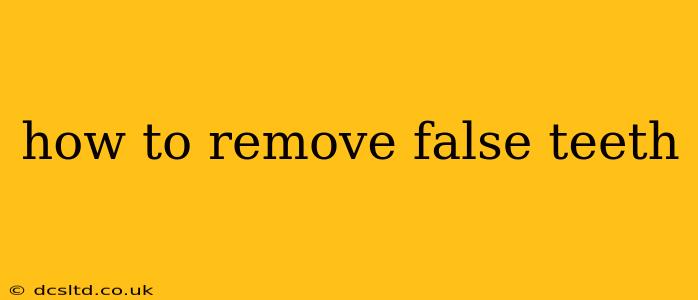Losing your natural teeth can be a significant life change, but advancements in dentistry offer comfortable and functional replacements like dentures and partial dentures. Knowing how to properly remove and care for your false teeth is crucial for maintaining oral hygiene and the longevity of your dentures. This comprehensive guide will walk you through the process, addressing common questions and concerns.
What is the Best Way to Remove My Dentures?
The best method for removing your dentures depends on the type you have (full or partial) and your individual dexterity. However, the core principle remains the same: gentle and controlled movements to avoid damage to your dentures or your gums.
For Full Dentures:
- Start with good lighting: Ensure you have sufficient light to see clearly.
- Use a mirror: A mirror will allow you to see what you are doing and ensure you're removing the dentures correctly.
- Break the seal: Gently rock the dentures back and forth, using your thumbs to break the suction seal between the dentures and your gums. Don't pull straight out! This is the most common mistake and can damage your gums.
- Lift and remove: Once the seal is broken, lift the dentures out slowly and carefully.
For Partial Dentures:
Partial dentures are generally easier to remove as they utilize clasps that attach to your remaining natural teeth.
- Identify the clasps: Locate the clasps on your partial denture.
- Gently unhook: Use your fingers to gently unhook the clasps from your teeth. Again, avoid any forceful pulling.
- Remove the denture: Once the clasps are unhooked, you should be able to remove the partial denture without difficulty.
Important Considerations:
- Sore Gums: If your gums are sore, consult your dentist. Improper removal techniques can cause irritation and bleeding.
- Difficulty Removing: If you experience consistent difficulty removing your dentures, schedule an appointment with your dentist. They can offer personalized advice and may adjust your dentures if necessary.
What if I Can't Remove My Dentures?
This can be alarming, but usually isn't a cause for major panic. Several factors can cause dentures to become stuck, including:
- Dry Mouth: Saliva acts as a lubricant. Dry mouth can create a stronger suction. Drinking water may help.
- Denture Adhesive: Excessive denture adhesive can make removal challenging. Consult your dentist for the best type and amount of adhesive.
- Poor Fit: If your dentures no longer fit correctly, they may become more difficult to remove. See your dentist for an adjustment or refitting.
If you genuinely cannot remove your dentures, do not attempt to force them out. This could damage your gums or teeth. Contact your dentist or a dental emergency service immediately for assistance.
How Do I Clean My False Teeth?
Cleaning your dentures meticulously is crucial for maintaining oral hygiene and the longevity of your dentures.
- Rinse thoroughly: After every meal, rinse your dentures under running water to remove food particles.
- Brush gently: Use a soft-bristled brush and denture cleaner to gently brush all surfaces of your dentures. Avoid abrasive cleaners that can scratch the surface.
- Soak overnight: Soaking your dentures overnight in a denture-cleaning solution helps remove stubborn stains and bacteria. Follow the instructions on your chosen cleaning solution.
Important Considerations:
- Never use hot water: Hot water can warp your dentures.
- Handle with care: Avoid dropping your dentures, as this can cause breakage.
- Regular Dental Checkups: Regular dental checkups are essential to monitor the health of your gums and the fit of your dentures.
How Often Should I Replace My Dentures?
Dentures generally need replacing every 5-7 years, or sooner if they become damaged or no longer fit comfortably. Regular dental checkups will help determine when replacement is necessary. Changes in your jawbone over time can affect the fit of your dentures.
What Kind of Denture Adhesive Should I Use?
The best type of denture adhesive depends on your individual needs and preferences. Your dentist can recommend an appropriate adhesive based on your specific situation.
By following these guidelines and consulting with your dentist regularly, you can ensure the comfort, functionality, and longevity of your false teeth, enjoying a healthy and confident smile. Remember, proper care is key to maintaining good oral health, even with dentures.
